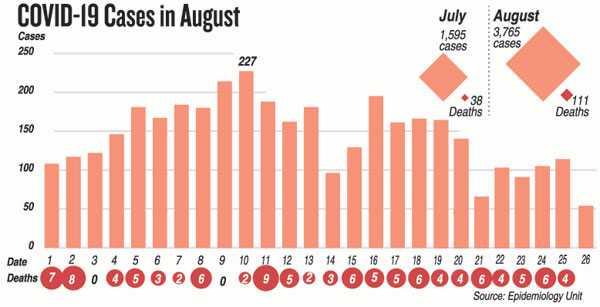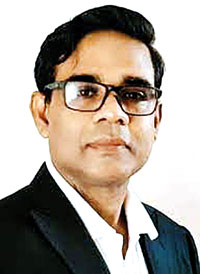News
‘No cause for fear of COVID-19 but need to protect vulnerable groups’
View(s):
By Kumudini Hettiarachchi
“There is a surge of COVID-19 infection but do not worry. It is mild disease and if we protect our vulnerable groups we can overcome the latest challenge being thrown at us by the pandemic.”
This reassurance comes from Consultant Microbiologist Dr. Mahen Kothalawala attached to the National Hospital of Sri Lanka (NHSL), Colombo.

Dr. Mahen Kothalawala
He says that he strongly believes that due to natural infection and vaccination, a considerable proportion of people around the world and in Sri Lanka have got protection against severe disease, critical illness and death. However, there would be mild to moderate illness.
“Currently, the epidemiology of the disease is ‘stable’. Even though the virus shows periodic trends such as peaks (when spread is great) and troughs (when spread is low) and there could be a sudden peak with a spillover outbreak, deaths and severe disease are uncommon,” says Dr. Kothalawala, explaining that those who are ‘fully’ vaccinated have 200 times lesser chance of dying than those who are unvaccinated.
What he means by ‘fully’ vaccinated is:
- Those who have got 2 Sinopharms and 2 Pfizers
- Those who have got 2 AstraZenecas with at least 1 Pfizer
- Those who have got 2 vaccines of any type plus the natural disease
However, he points out that there are certain groups who are still vulnerable. Sri Lanka has to take special care over them.
According to Dr. Kothalawala these vulnerable groups are:
n All children below 12 years of age – this group is unvaccinated. Even though the number of deaths among them, if they contract COVID-19 would be small, the health authorities need to be watchful. Sri Lanka has to safeguard them from complications such as Long COVID and Multisystem Inflammatory Syndrome in Children (MIS-C), a condition where different parts of the body – heart, lungs, kidneys, brain, skin, eyes or gastrointestinal organs – can get inflamed.
- The elderly (those over 60 years of age) – in this group, immunity contracts with time and the immune system goes into decline like all other bodily functions. This is ‘immunosenescence’ – a process of immune dysfunction that occurs with age.
- Those who have undergone transplants or chemotherapy or are immuno-compromised in some form.
“As severe disease and death can occur among these groups – vaccinated but falling into the elderly category, vaccinated but immuno-compromised people of all ages starting from 12 years and the unvaccinated paediatric group of under 12 years – they need to be given extra protection,” he says.
Looking at the trajectory of outbreaks of this RNA virus, Dr. Kothalawala points out that the scientists have to go by the way similar viruses [SARS-CoV-1 (Severe Acute Respiratory Syndrome-Coronavirus 1); MERS (Middle East Respiratory Syndrome); and other human coronaviruses] have behaved. They cannot expect the new coronavirus SARS-CoV-2 which is causing COVID-19, to be different. There is no model for matching and scientists can only predict in retrospect how it behaves.
“Although it did cause havoc in 2020 and 2021, in recent times there has been no high-sequence impact,” he says, explaining that what can be predicted is that it would cause periodic outbreaks but would not be a major burden to the health sector.
| Protective measures – what health sector & public should do The measures Dr. Mahen Kothalawala recommends are:
There should be tocilizumab for hospitalized patients with severe COVID-19 and Pfizer’s Paxlovid, which a study published in the New England Journal of Medicine (NEJM) on August 24 (Wednesday) has found to reduce COVID-19 death by 81% in older adults even though it is not effective in younger patients. His advice to people is:
| |
The best way to say that you found the home of your dreams is by finding it on Hitad.lk. We have listings for apartments for sale or rent in Sri Lanka, no matter what locale you're looking for! Whether you live in Colombo, Galle, Kandy, Matara, Jaffna and more - we've got them all!

